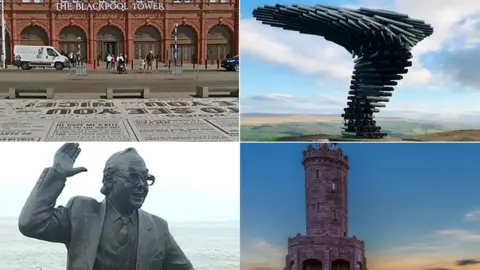Lancashire council leaders to ask for £5.6bn in devolution bid
 Google/BwD Council
Google/BwD CouncilLancashire's political leaders are planning to ask the government to pump £5.6bn into the county as part of a long-awaited devolution bid.
They said the funds would be spent on projects across the region designed to improve skills, housing and transport.
However, the county does not want to have an elected mayor like nearby Greater Manchester and Merseyside.
The Conservative leader of Lancashire County Council said the proposal was a "bold and exciting step".
Lancashire currently has one county council, two unitary authorities and 12 city or borough councils.
The £5.6bn figure is contained in a blueprint drawn up by the 15 leaders, who have agreed the draft basis on which they could seek a so-called "county deal" with the government.
The document, which has been seen by the Local Democracy Reporting Service (LDRS), sets out four wide-ranging themes that would be likely to dictate the shape of any future agreement with ministers.
'Positive change'
The local authority leaders have also signed up to a series of principles about how Lancashire would govern itself if it secures the funding, which does not include an elected mayor.
In 2020, all 15 leaders finally agreed in principle to explore the formation of a combined authority to be overseen by a mayor with "limited powers".
There was also a separate government demand to simplify the complex two-tier system, a move which could have led to the abolition of every existing council in the region and the creation of three new standalone authorities.
However, both of those roadblocks were swept away in summer 2021 when Boris Johnson declared in a speech on levelling up that there was no "one size fits all" template for devolution.
 LDRS
LDRSDiscussions between local leaders to design a devolution bid began back in the autumn, resulting in the draft plan on which the region's MPs were briefed earlier, the LDRS said.
The proposed themes and governance arrangements are now set to be put before meetings of each of Lancashire's councils in the coming weeks in order to seek approval from their members for what has been suggested so far.
Councillor Phillippa Williamson, the leader of Lancashire County Council, said the proposal was a "bold and exciting step towards a new deal" that would "benefit every part of the county".
"It's not about councils losing power, it's about us coming together to have one voice and being a credible partner with the government and others to be able to get investment and development and really improve things in Lancashire," she said.
She said that some of the £5.6bn being sought would stem from the county taking over responsibility for existing projects for which money was already available - but which are currently being delivered by the government or its agencies.
Speaking on behalf of the county's 12 borough and district councils, the Labour leader of Chorley Council, Alistair Bradley, said: "As part of a county deal, we would expect to get extra money that can be spent in a way that works best for Lancashire.
"We are all currently working together to bring about transformational change for our county and ensure we secure additional funding that will ultimately lead to positive change."
Councillor Mohammed Khan, the Labour leader of Blackburn with Darwen Council, said he was "deeply committed to working together across Lancashire to make sure services stay truly local as well as high quality".
"It's essential that we have a united voice to give us greater influence with government to access much needed resources to directly benefit the people we serve," he added.
The Labour leader of Blackpool Council, councillor Lynn Williams, said: "For too long, decisions that impact Lancashire have been made in London.
"Devolving funding and power to the most local level possible is absolutely the right thing to do."

Analysis
By BBC Radio Lancashire political reporter Mike Stevens
After decades of trying, Lancashire's council leaders have finally managed to agree on something.
The last few months have seen intense negotiations between the 15 leaders - who come from a variety of different political backgrounds.
The result of those meetings is a formal agreement to shout together with one voice when it comes to things like applying for government funding and working with the private sector.
However, the deal won't change the current makeup of the local councils and crucially there are no plans for a combined authority or an elected mayor - like many of our neighbours have.
Critics will say the county will struggle to be heard if there's no figurehead to lead the charge but supporters will argue that's the beauty of this agreement - everybody involved has an equal say.

Why not follow BBC North West on Facebook, Twitter and Instagram? You can also send story ideas to [email protected]
